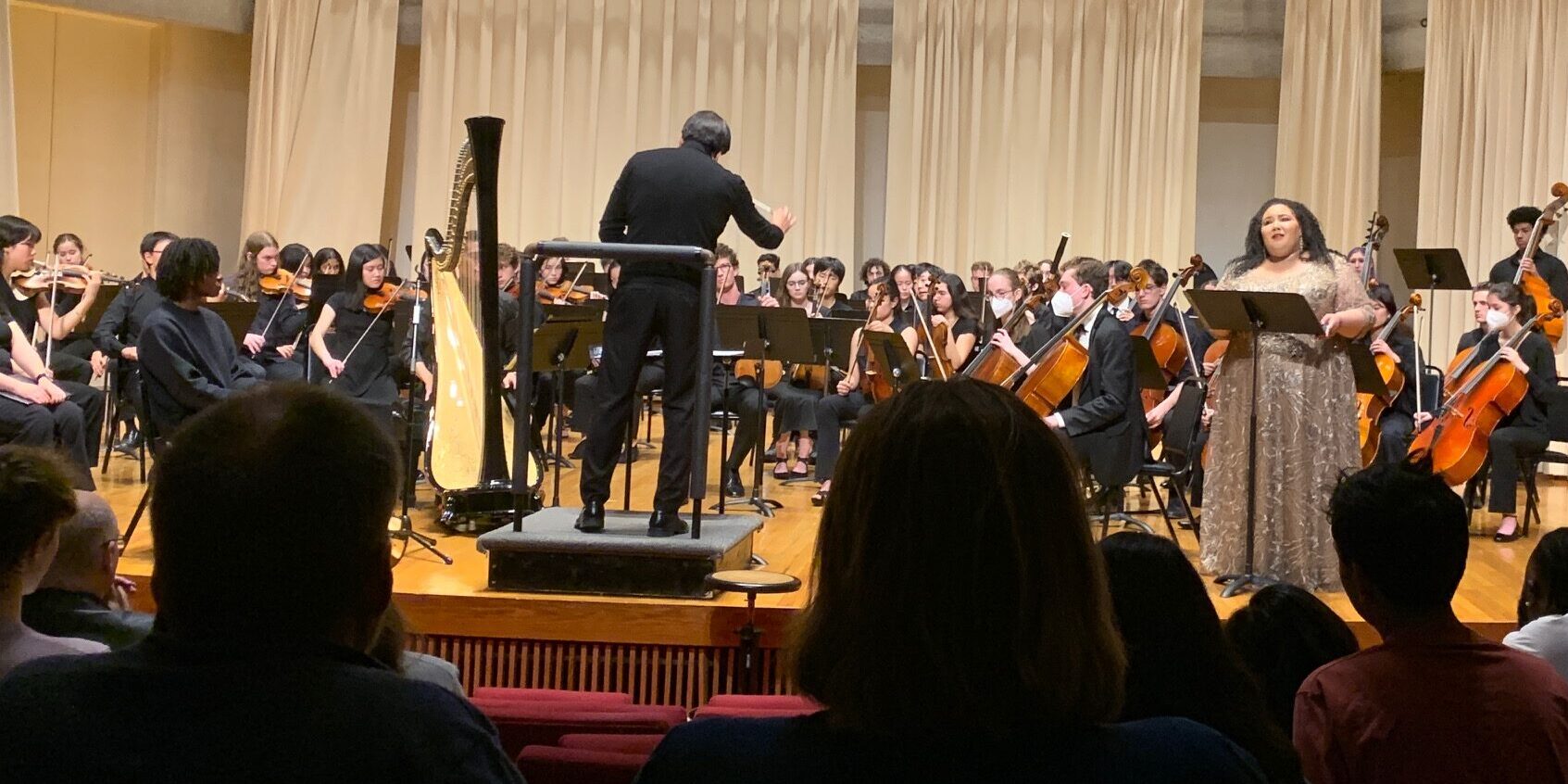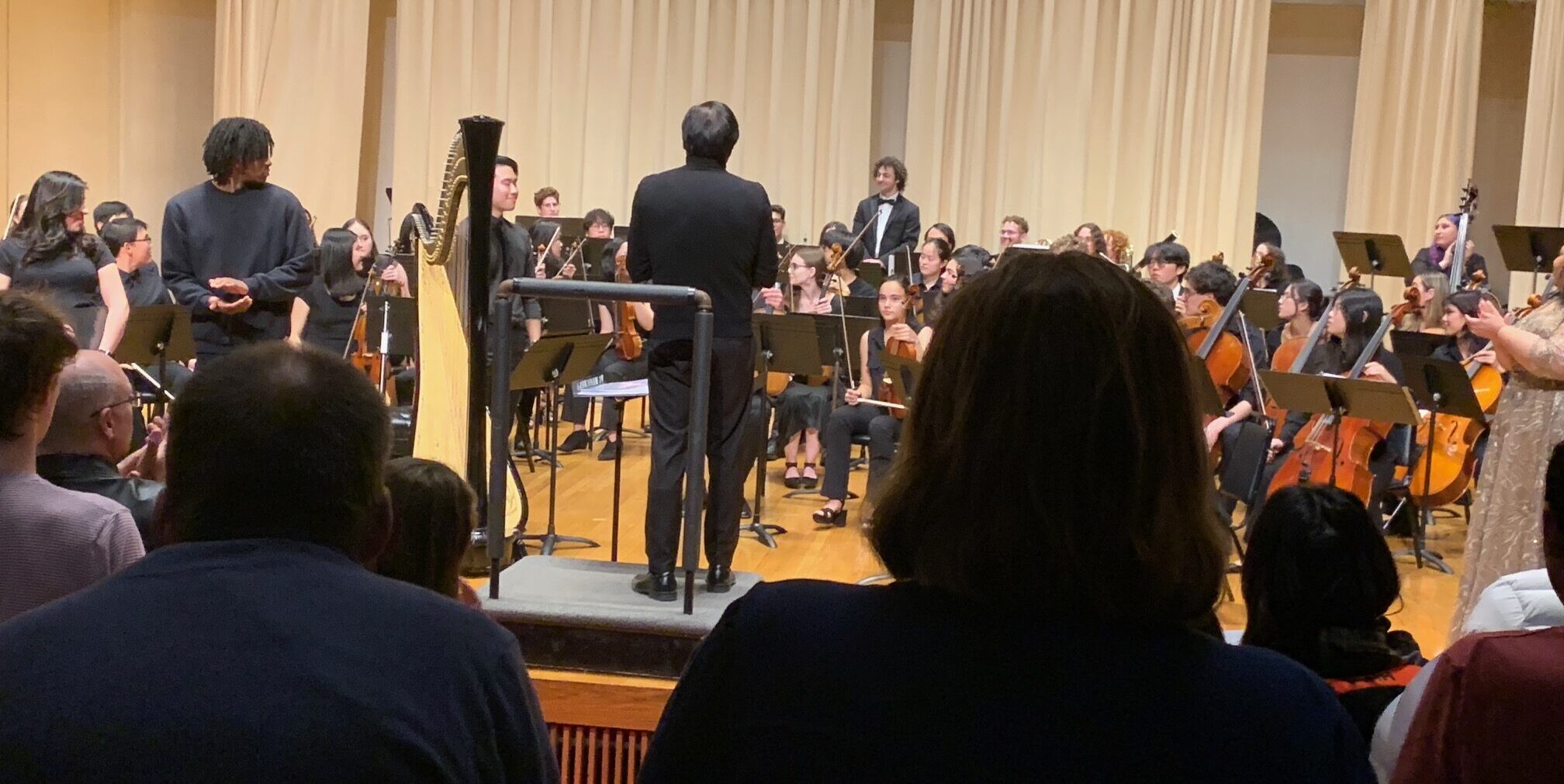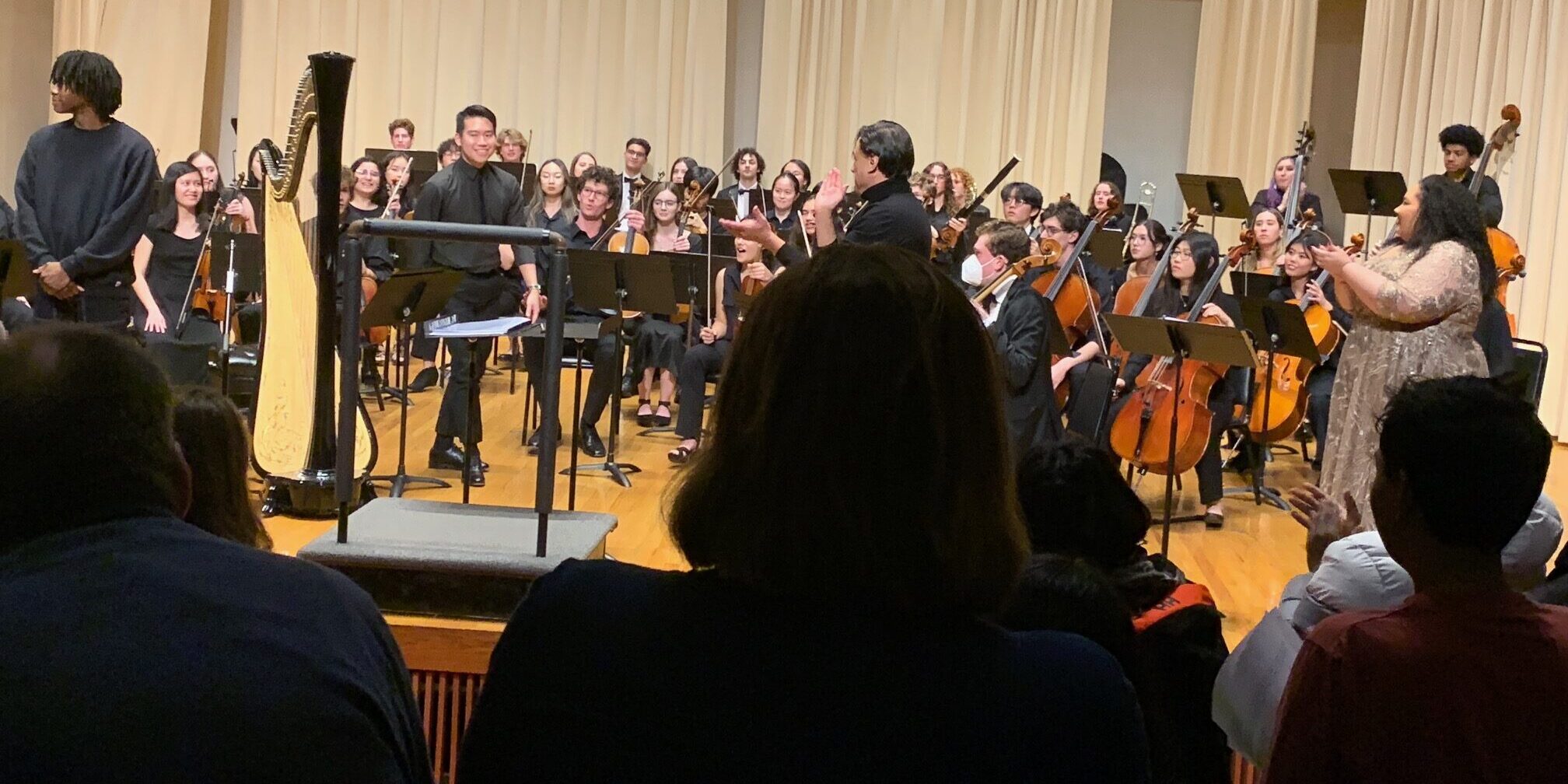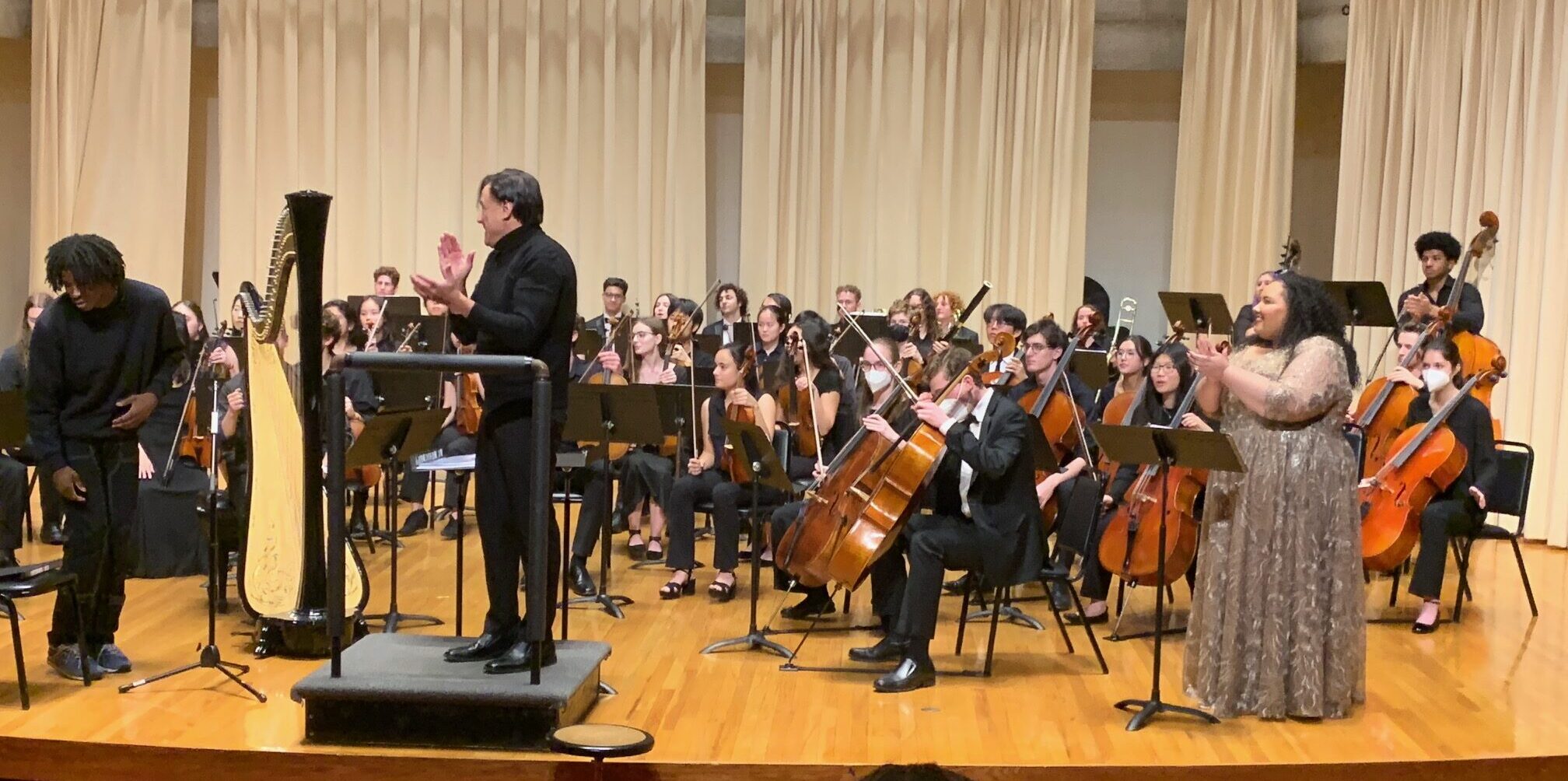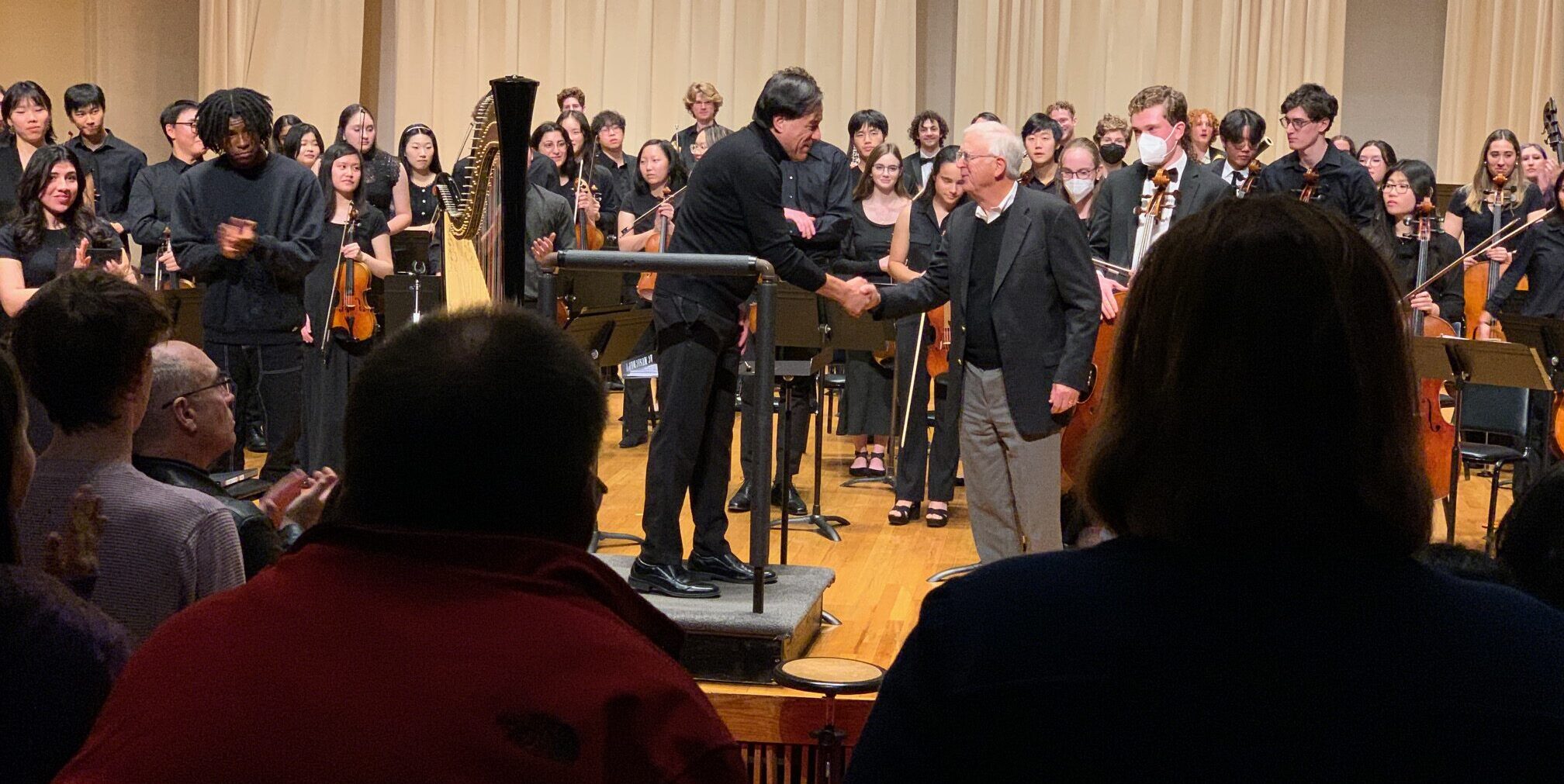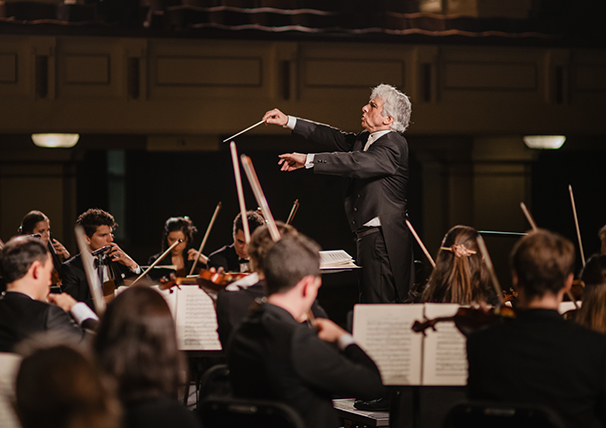Performances
JFK: The Last Speech Premiere
July 16 2023 by Colorado Music Festival, Boulder
Peter Oundjian, conductor Janice Chandler-Eteme, soprano Kevin Deas, narrator
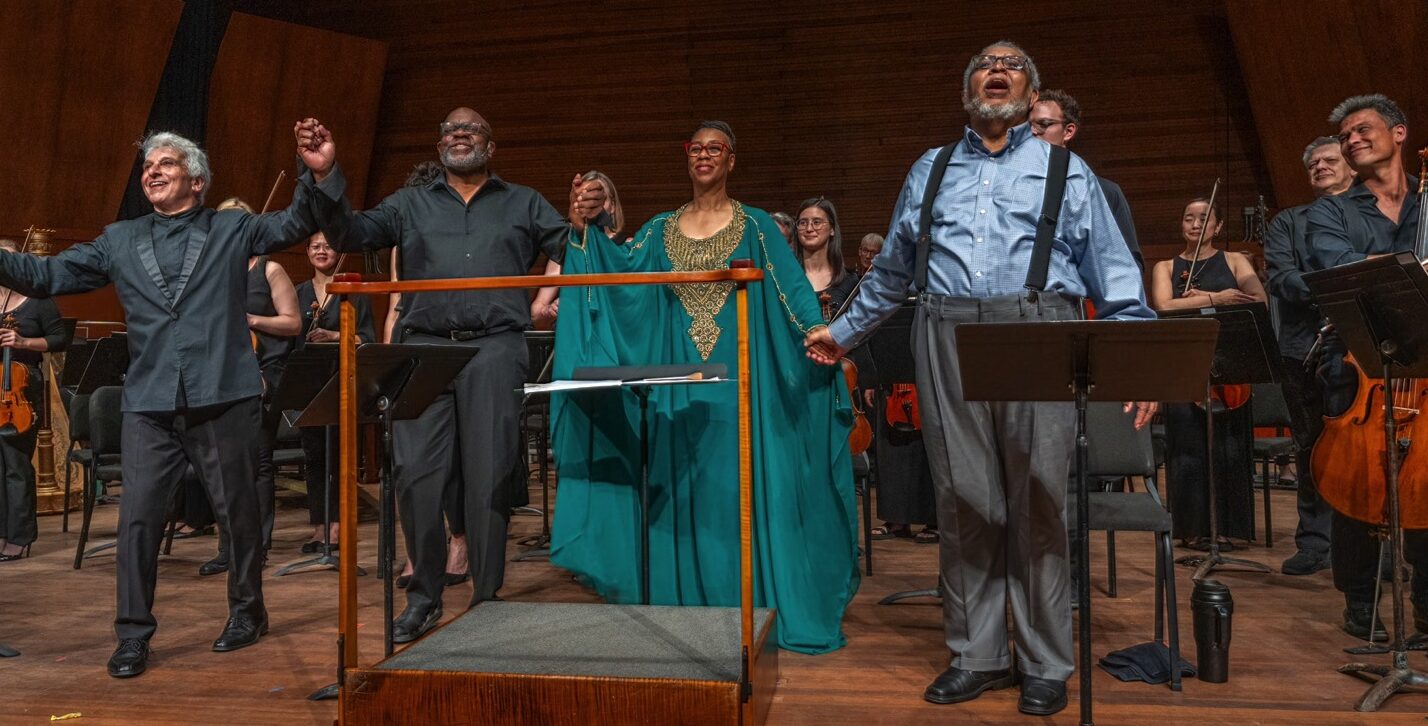
Colorado Music Festival Orchestra Celebrating: Conductor, Narrator and Soprano
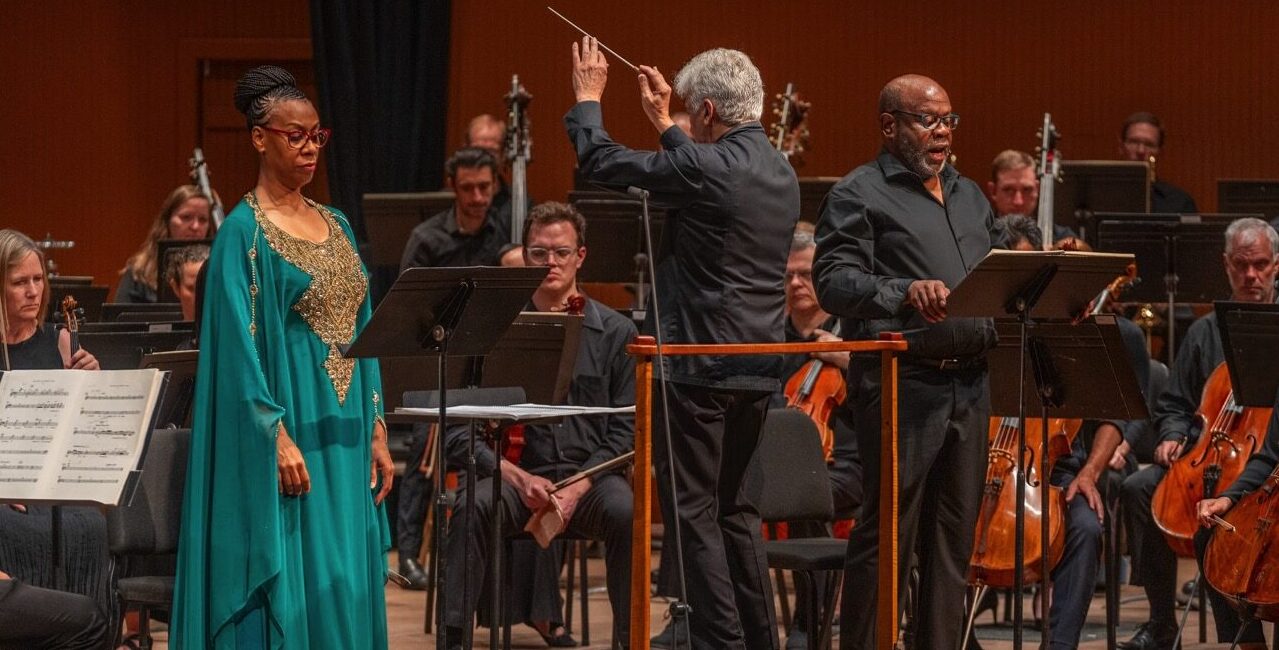
Colorado Music Festival Performing with Soprano and Narrator
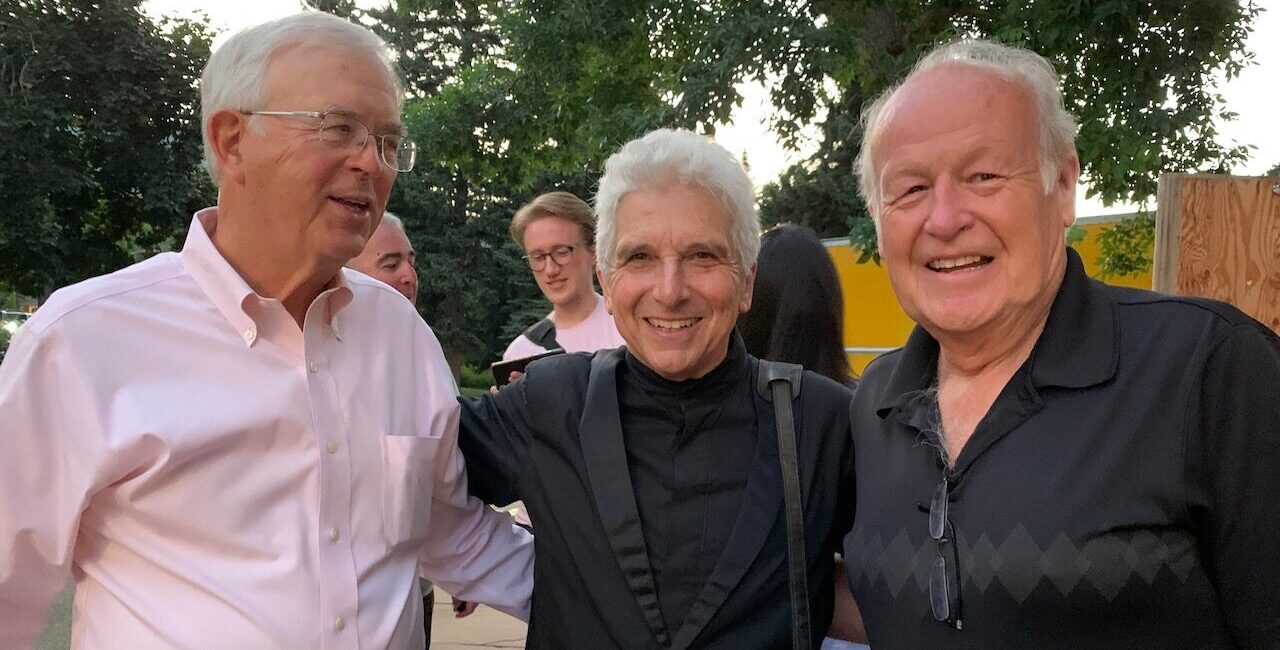
Neil Bicknell, Librettist with Peter Oundjian, Conductor and Bestor Cram, Director of the Documentary Film JFK: The Last Speech
The Colorado Music Festival presents an annual six-week summer concert season at Chautauqua Auditorium in Boulder, Colorado. The Festival Orchestra is comprised of 42 principal players, exceptional national and international musicians. Under the baton of Music Director Peter Oundjian, this well-loved orchestra performs at the base of the iconic Flatiron Mountains every summer, creating a truly world-class experience. The musicians represent 44 orchestras from 23 states, 4 provinces, and 3 countries.1
Dallas Symphony Orchestra Performance
October 6, 7, 8 2023
Peter Oundjian, conductor Janice Chandler-Eteme, soprano Quincy Roberts, narrator
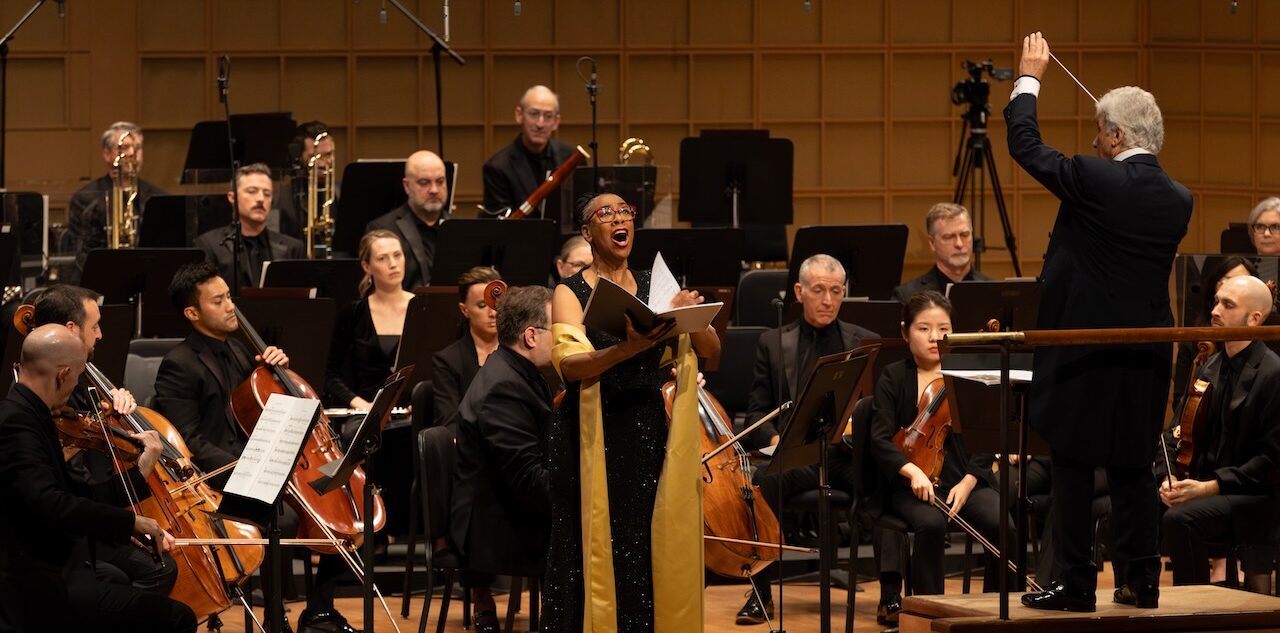
Dallas Symphony’s Soprano Janice Chandler-Eteme
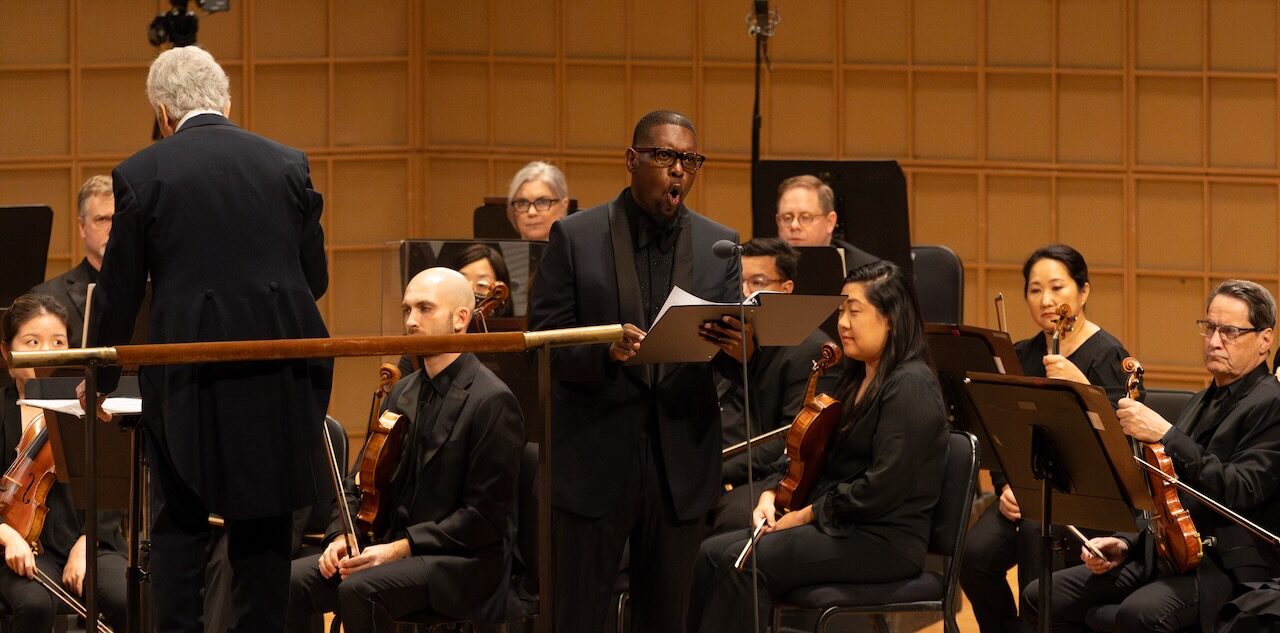
Dallas Symphony’s Quincy Roberts Narrating JFK Words
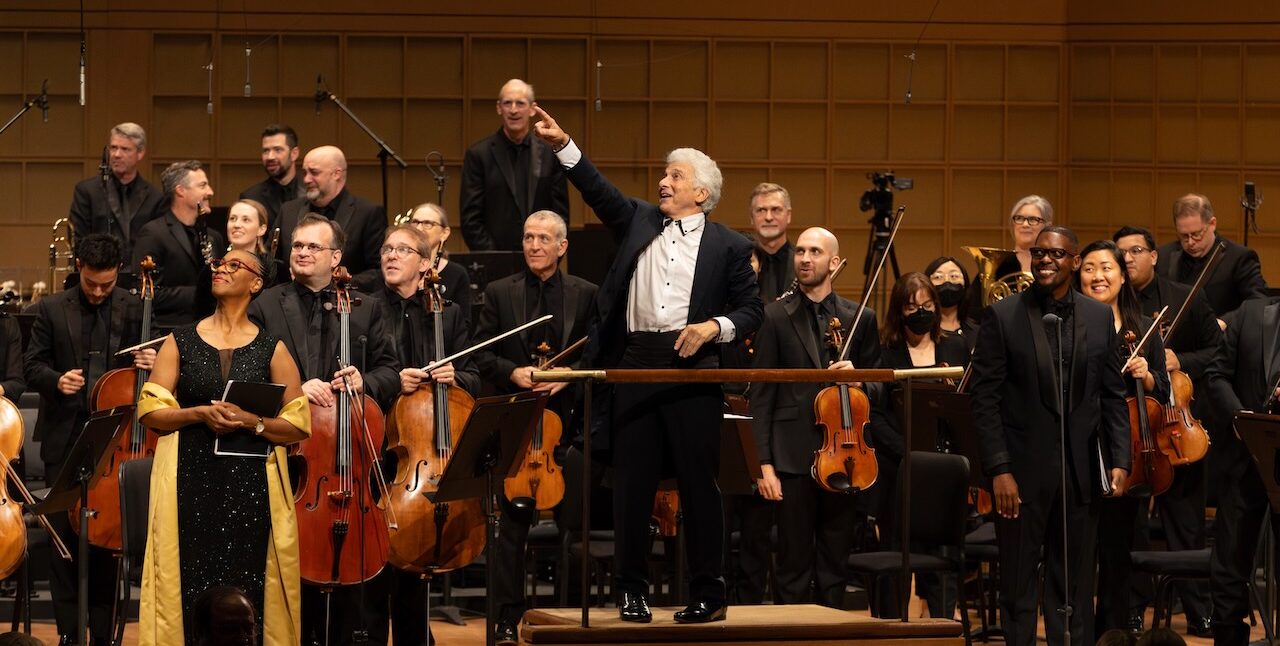
Dallas symphony Conductor Peter Oundjian Hails Libbretist
The National Symphony Orchestra Performance
October 26 & 28, 2023
Kevin John Edusei, conductor Katerina Burton, soprano Phylicia Rashad, narrator
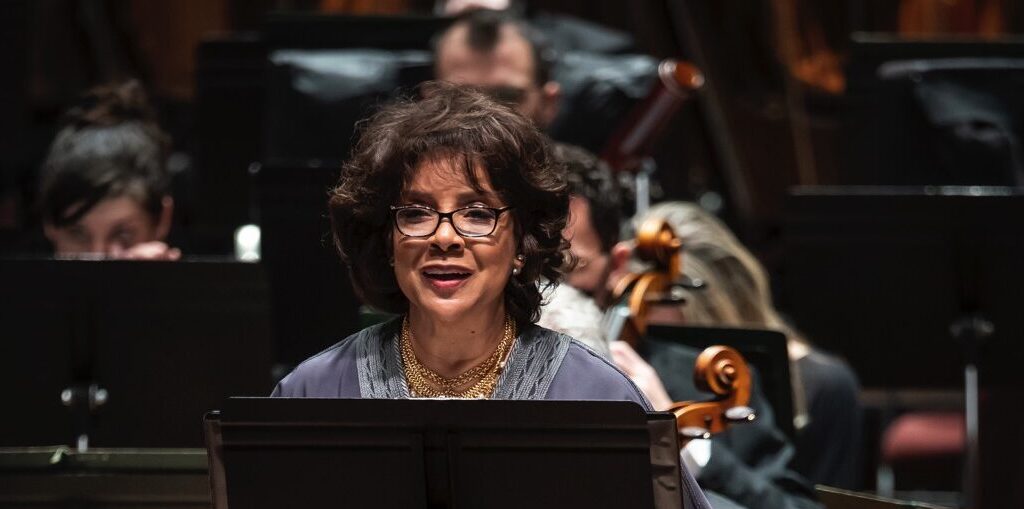
National Symphony Narrator Phylicia Rashad
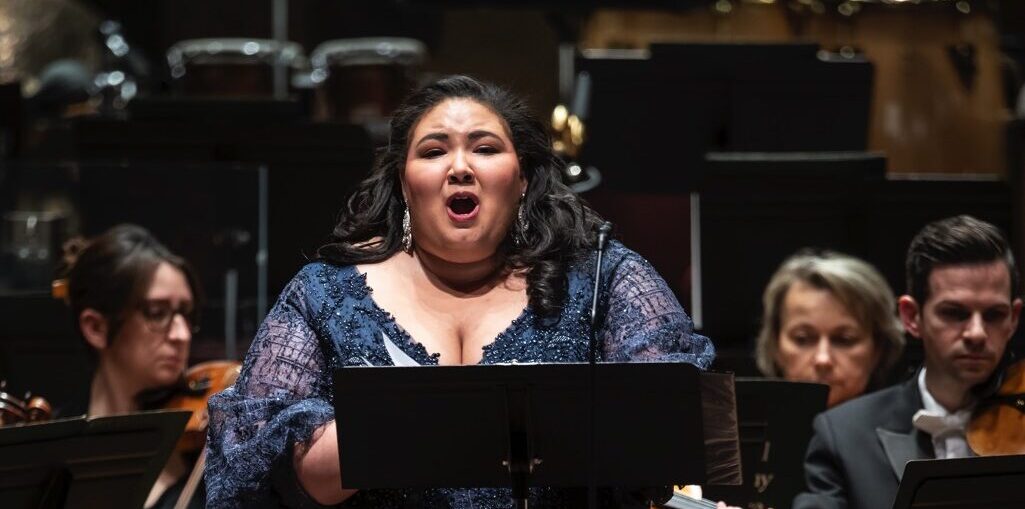
National Symphony Soprano Katerina Burton
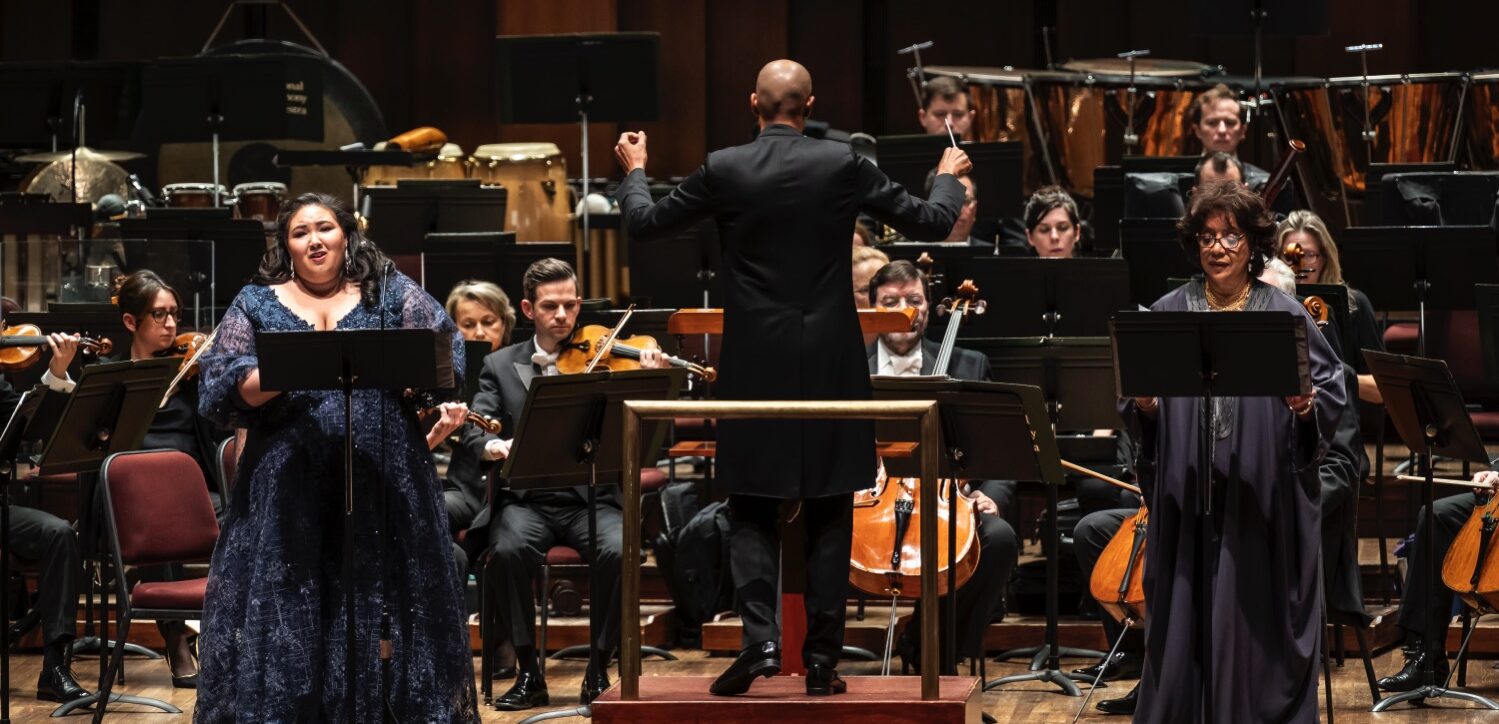
National Symphony Orchestra with Soprano, Conductor John Edusei, and Narrator
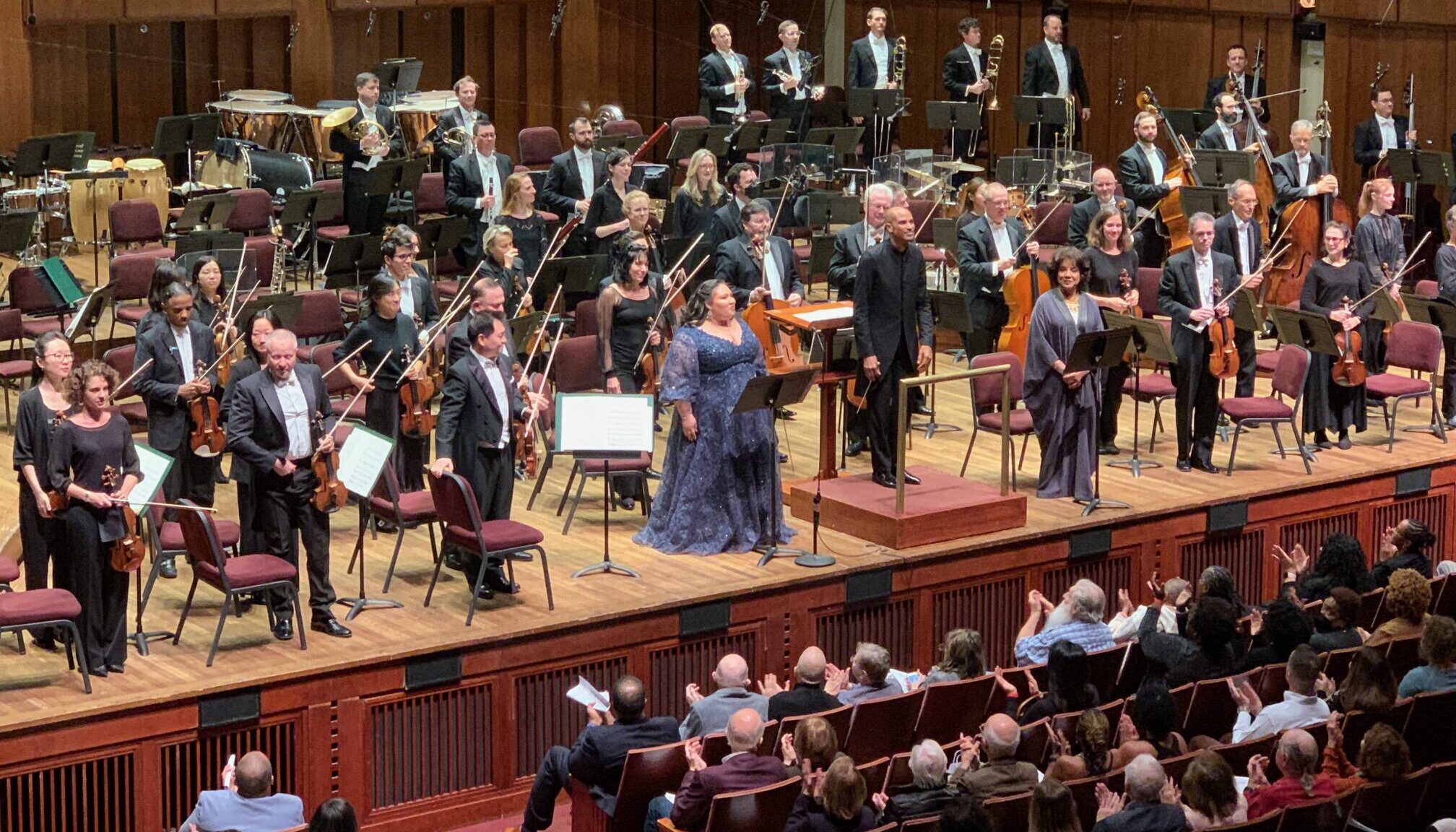
The National Symphony Orchestra Accepting the Audience’s Applause
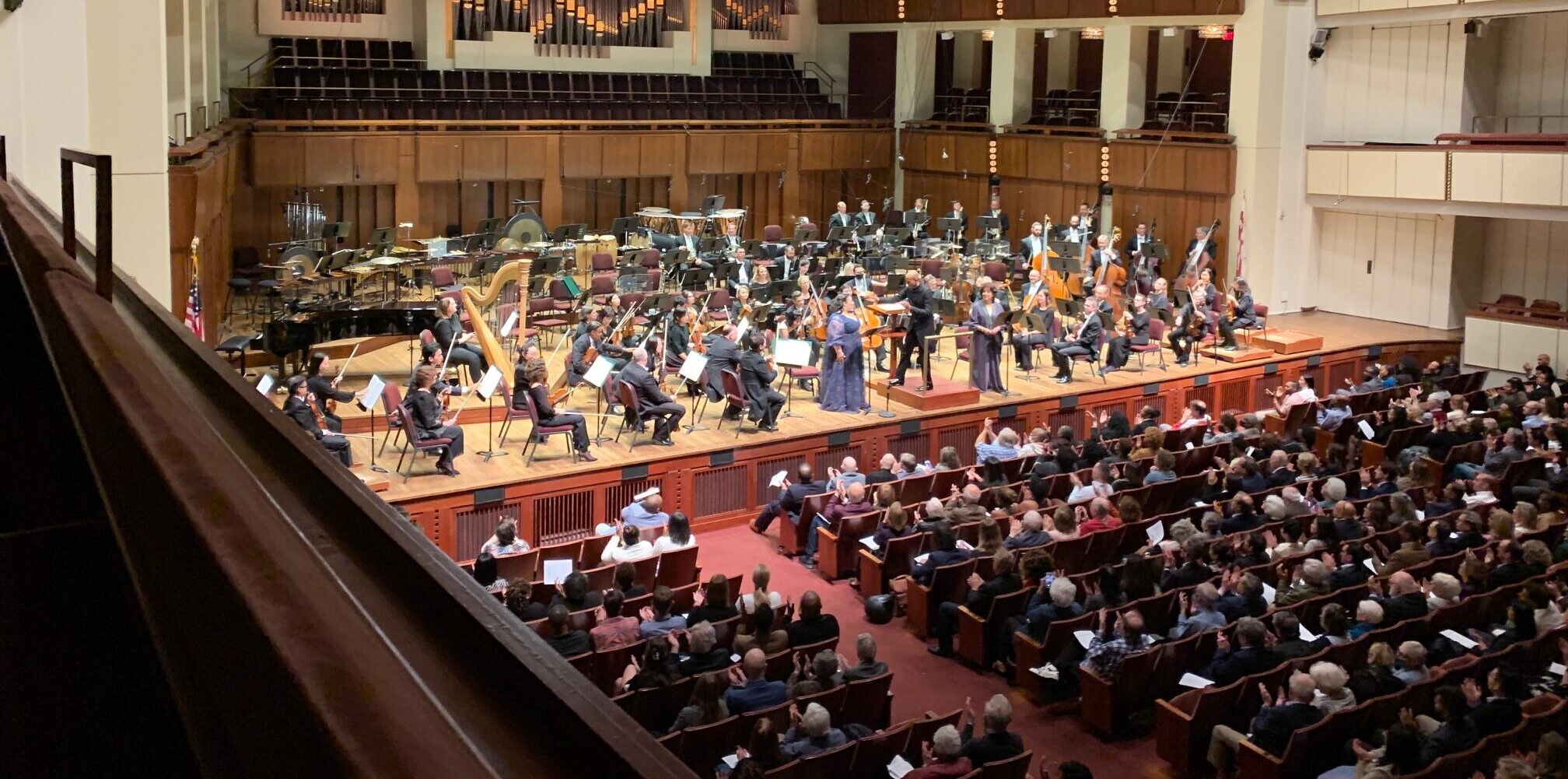
The National Symphony Orchestra Performing JFK: The Last Speech
The Indianapolis Symphony Orchestra Performance
October 27 & 28, 2023
Alexander Shelley, conductor Janice Chandler-Eteme, soprano Joshua A. Thomas, narrator
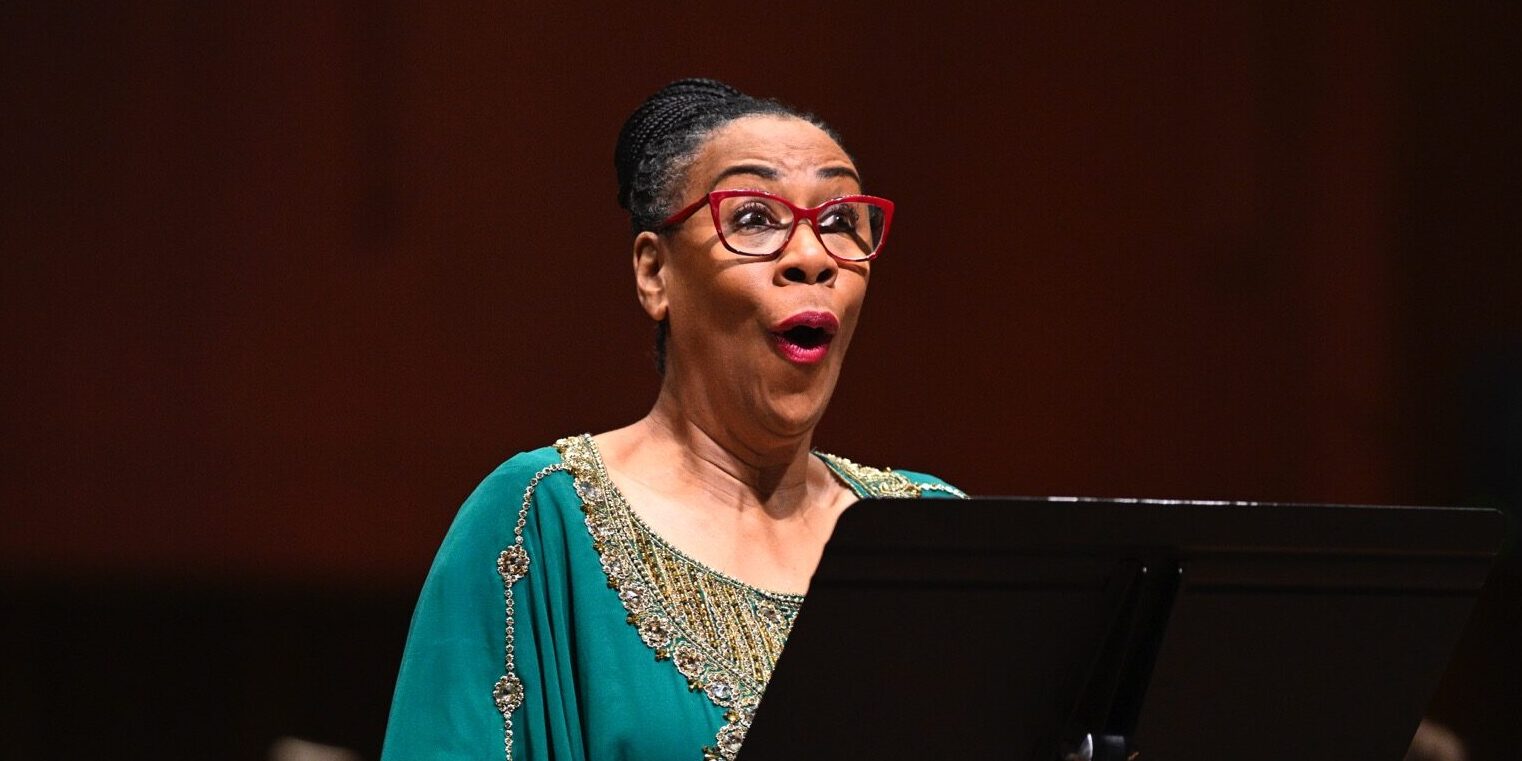
Indianapolis Symphony Soprano Janice Chandler-Eteme
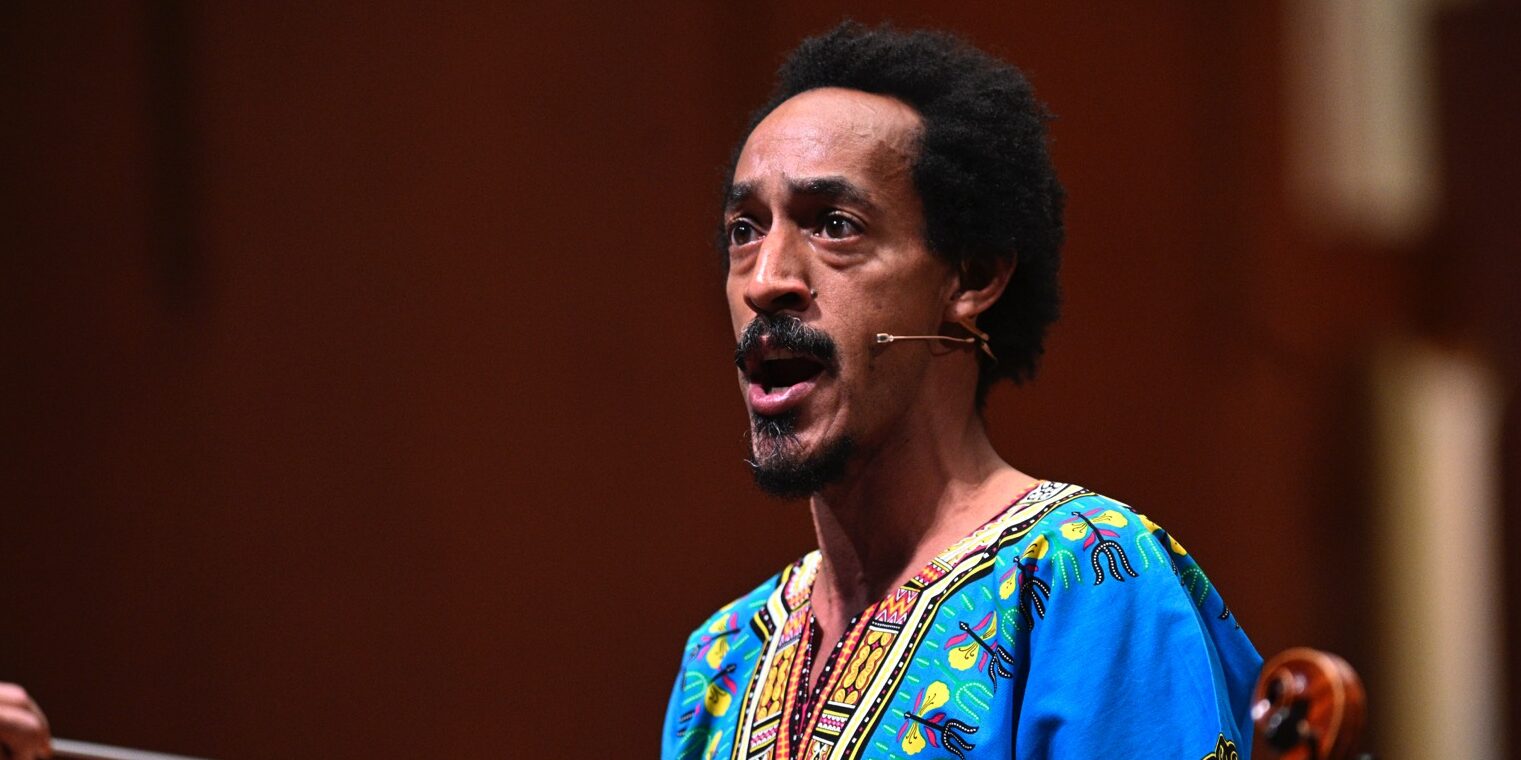
Indianapolis Symphony’s Narrator Joshua A.Thompson
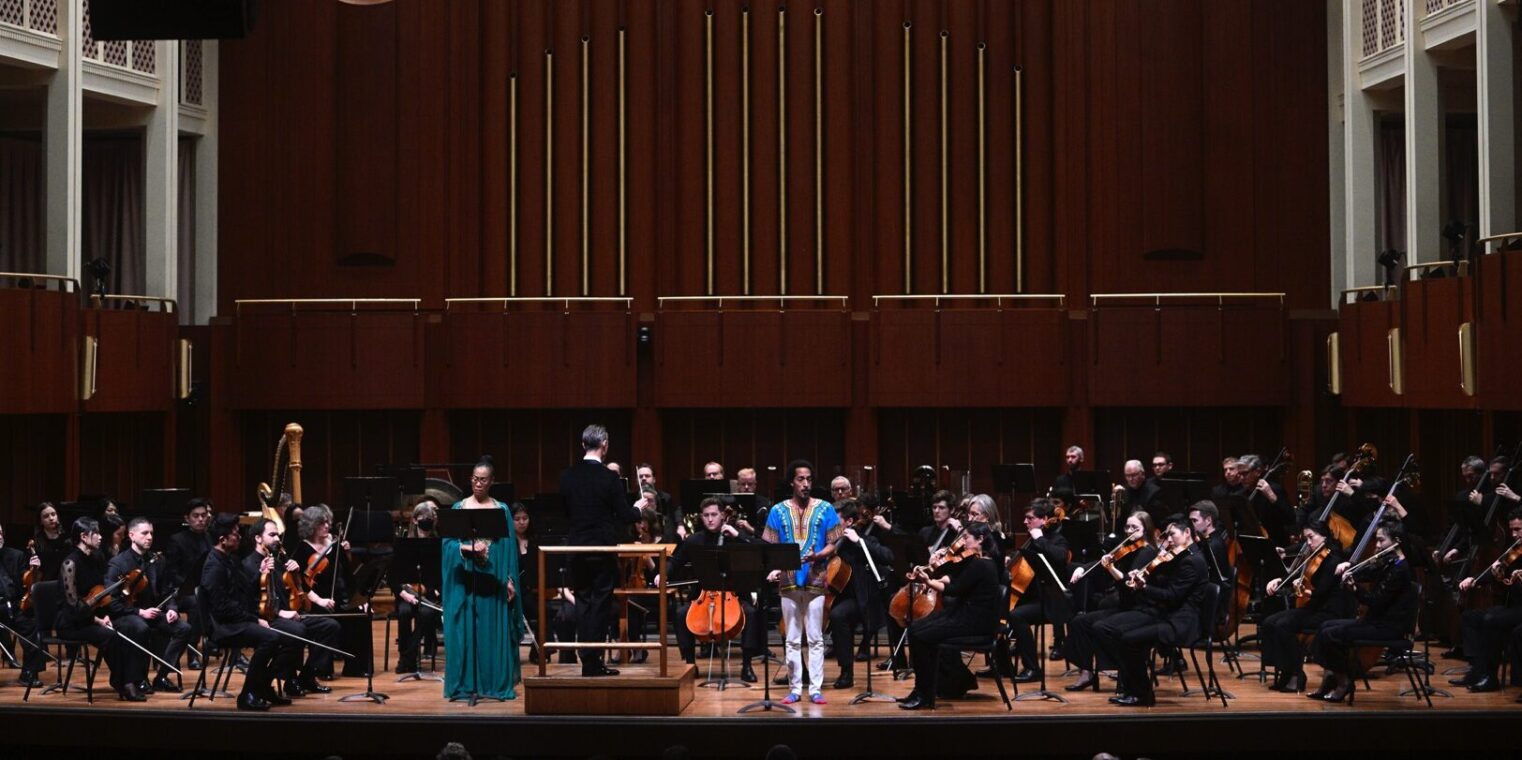
Indianapolis Symphony Orchestra Performing JFK: The Last Speech
Amherst Symphony Orchestra Performance
November 11, 2023
Mark Swanson conductor Katerina Burton, soprano Seven Students, narrators
The Yale Philharmonia Performance
November 16, 2023
Peter Oundjian, conductor Jillian Tate, soprano Finn Sagal, narrator
The Background Story
JFK invited Robert Frost to be the first poet ever to speak at a Presidential Inauguration and Frost was a frequent guest at the Kennedy White House. A break in the relationship between Kennedy and Frost occurred when Frost misspoke upon returning from the USSR, where he met with Premier Khrushchev in September 1962.
Kennedy’s speech at Amherst represented a posthumous reconciliation with Frost, nine months after Frost died, and was called the “most majestic” of JFK’s career. Twenty-seven days later, Kennedy was assassinated.
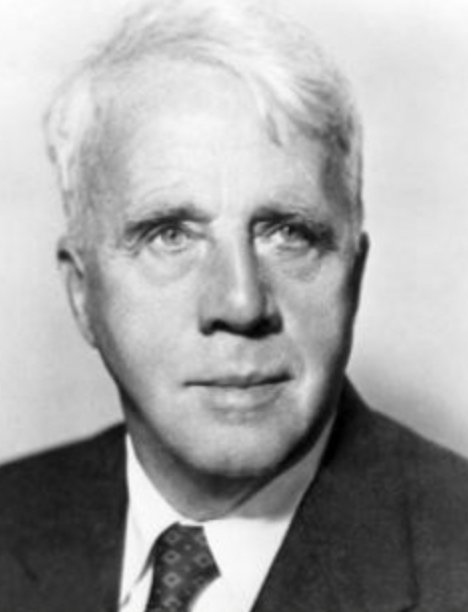
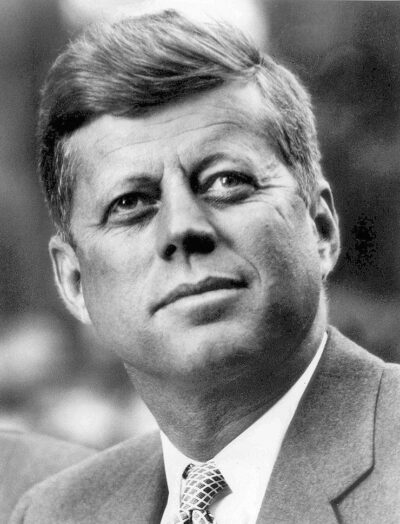
Setting for the Symphony
Inspired by President Kennedy’s speech honoring the poet Robert Frost, delivered at Amherst College October 26, 1963, the work will include lines from JFK’s Amherst speech interspersed with lines from poems by Robert Frost – a libretto authored by a then Amherst senior, who heard the President speak on that idyllic fall day.
Adolphus Hailstork, Composer
In describing this piece, Dr. Hailstork writes:
“My plan is to set supporting music to John F. Kennedy’s words to be presented by a reader (male or female) and to set selections from the poetry of Robert Frost to be sung by either a soprano (pref.) or tenor.
“My writing will reflect the autumn season, the solemnity of the moment, and the unique oratorical gifts of Kennedy the president, and the profound literary gifts of Frost the poet.”
From the Libretto:
The President:
Our national strength matters, but the spirit which informs and controls our strength matters just as much. This was the special significance of Robert Frost…He held a deep faith in the spirit of man.
The Poet:
And God has taken a flower of gold
And broken it, and used therefrom
The mystic link to bind and hold
Spirit to matter till death come.
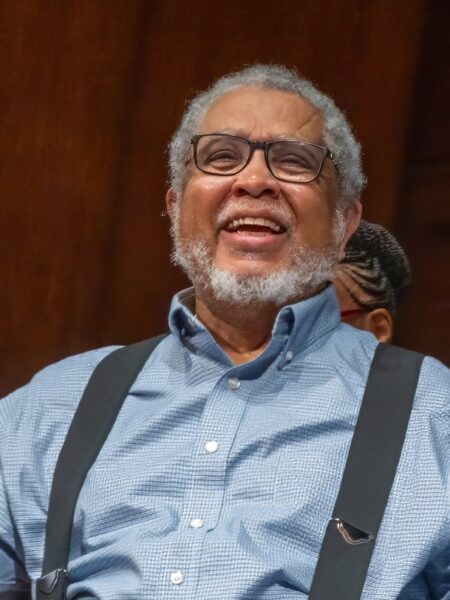 Adolphus Hailstork
Adolphus HailstorkDr. Hailstork has written numerous works for orchestra, opera, chorus, solo voice, piano, organ, various chamber ensembles, and band.2
Recent commissions include RISE FOR FREEDOM, an opera about the Underground Railroad, premiered in the fall of 2007 by the Cincinnati Opera Company, SET ME ON A ROCK (re: Hurricane Katrina), for chorus and orchestra, commissioned by the Houston Choral Society (2008), and the choral ballet, THE GIFT OF THE MAGI, for treble chorus and orchestra, (2009). In the fall of 2011, ZORA, WE’RE CALLING YOU, a work for speaker and orchestra was premiered by the Orlando Symphony. I SPEAK OF PEACE commissioned by the Bismarck Symphony (Beverly Everett, conductor) in honor of (and featuring the words of) President John F. Kennedy was premiered in November of 2013.
Hailstork’s newest works include THE WORLD CALLED (based on Rita Dove’s poem TESTIMONIAL), a work for soprano, chorus and orchestra commissioned by the Oratorio Society of Virginia (premiered in May 2018) and STILL HOLDING ON (February 2019) an orchestra work commissioned and premiered by the Los Angeles Philharmonic. He is currently working on his Fourth Symphony, and A KNEE ON A NECK (tribute to George Floyd) for chorus and orchestra.
Significant performances by major orchestras (Philadelphia, Chicago, and New York) have been led by leading conductors such as James de Priest, Paul Freeman, Daniel Barenboim, Kurt Masur, Lorin Maezel, Jo Ann Falletta and David Lockington. Thomas Wilkins conducted Hailstork’s AN AMERICAN PORT OF CALL with the Boston Symphony Orchestra.
Adolphus Hailstork received his doctorate in composition from Michigan State University. He had previously studied at the Manhattan School of Music, at the American Institute at Fontainebleau and at Howard University. Hailstork is Professor of Music, Composer-in-Residence and Eminent Scholar at Old Dominion University in Norfolk.
Peter Oundjian, Conductor and Music Director
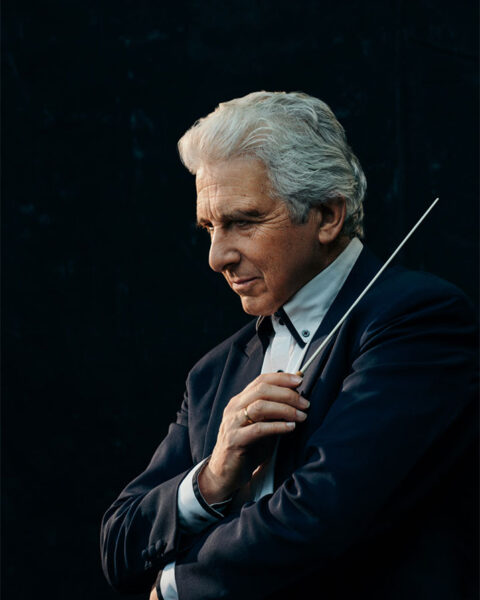
The Festival’s Music Director Peter Oundjian has a multi-faceted portfolio as a conductor, violinist, professor, and artistic advisor. He has been celebrated for his musicality, eye toward collaboration, innovative programming, and engaging personality. Oundjian joined the Colorado Music Festival in 2018. 3
An outstanding violinist, Oundjian spent 14 years as the first violinist for the renowned Tokyo String Quartet before he turned his energy toward conducting.
Now carrying the title Conductor Emeritus for the Toronto Symphony, Oundjian’s fourteen-year tenure as Music Director served as a major creative force for the city of Toronto and was marked by a reimagining of the TSO’s programming, international stature, audience development, touring and a number of outstanding recordings, garnering a Grammy nomination in 2018 and a Juno award for Vaughan Williams’ Orchestral Works in 2019.
From 2012-2018, Oundjian served as Music Director of the Royal Scottish National Orchestra during which time he implemented the kind of collaborative programming that has become a staple of his directorship.
In 2022/2023 season Oundjian will conduct the opening weekend of Atlanta Symphony, followed by return engagements with Baltimore, Indianapolis, Colorado and Toronto symphonies, as well as a visit to New World Symphony.
Oundjian has been a visiting professor at Yale University’s School of Music since 1981, and in 2013 was awarded the school’s Sanford Medal for Distinguished Service to Music. He regularly conducts the Yale, Juilliard, Curtis and New World symphony orchestras.
About the Libretto
On an idyllic New England fall day in 1963, President Kennedy spoke at Amherst College in Massachusetts to honor his friend, the poet Robert Frost, who for many years had taught at Amherst. It would be the President’s last major speech.
The libretto for “JFK: The Last Speech” celebrates these two men and the values they shared – a faith in the human spirit, a commitment to learning and reason, and an awareness of the fragility of our democracy. Conceived as a musical conversation between the President and the Poet, the libretto alternates narrated lines from the President’s Amherst speech with lines from Frost’s poems. But the Poet’s words are sung, as if from an oracle on high, as Frost had died nine months prior to Kennedy’s commemoration.
The libretto opens with lines from Frost’s “October,” evocative of the autumn day, and includes an entreaty to make the day seem less brief, an innocent reminder of the President’s impending fate.
With his characteristic courage to speak the truth that inspired the nation, President Kennedy opens his speech reminding the students that they are privileged by virtue of the education they are receiving. Such privilege carries with it responsibility – a responsibility to serve the public interest, and to contribute not only their talents to the “Great Republic,” but as well, their sympathy, their understanding, and their compassion. Pledging his confidence in the students, Kennedy quotes from “A Road Not Taken,” and counsels them that a decision to serve the nation will make “all the difference.”
The President’s tribute to Frost is also an ode to the indispensable role the arts and artists play in ensuring the strength of our democracy.
Weaving the Poet’s words throughout his speech, Kennedy speaks of how Frost coupled poetry and power and of Frost’s belief that when power leads man toward arrogance, poetry reminds him of his limitations. Then he offers his own belief that “when power corrupts, poetry cleanses. For art establishes the basic human truths which must serve as the touchstone of our judgment.”
Acknowledging the solitude that can come with the artist’s search for truth and concern for justice, Kennedy uses Frost’s words to argue that a nation that disdains the mission of art has “nothing to look backward to with pride, and nothing to look forward to with hope.”
The President ends his tribute with his aspirations for America to match its military strength with its moral restraint and its wealth with its wisdom – for an America which commands respect throughout the world not only for its strength but for its civilization as well. To achieve this vision, Kennedy realizes he has “miles to go” before he sleeps, a phrase from Frost that he often used on the campaign trail.
At Kennedy’s inauguration, Robert Frost honored the President with a poem written for the occasion. He predicted the new administration would usher in a golden age of poetry and power, “of which this noonday’s the beginning hour.” At Amherst, Kennedy honors Frost as one whose contribution was not to our size but to our spirit, not to our self-esteem but to our self-comprehension. “Our national strength matters,” he says, “but the spirit which informs and controls our strength matters just as much. This was the special significance of Robert Frost.”
The President’s speech at Amherst has been called the “most majestic” of his career. Kennedy exhibited both his sensitivity to the human spirit and his civic values as he spoke that day — when he spoke about the importance of the arts and artists in our democracy; and about the importance of those who question power, “especially when that questioning is disinterested.” He said we need the service of every man and woman, “to make it possible for Americans of all different races and creeds to live together in harmony, to make it possible for a world to exist in diversity and freedom. All this requires the best of all of us.”
– Neil Bicknell, 2022
“How we need to hear these words today: about privilege and responsibility, about power and necessary challenges [to power], about the arts as conscience. “
– Scott Cantrell, Dallas Morning News, October 7, 2023
Neil Bicknell, Librettist
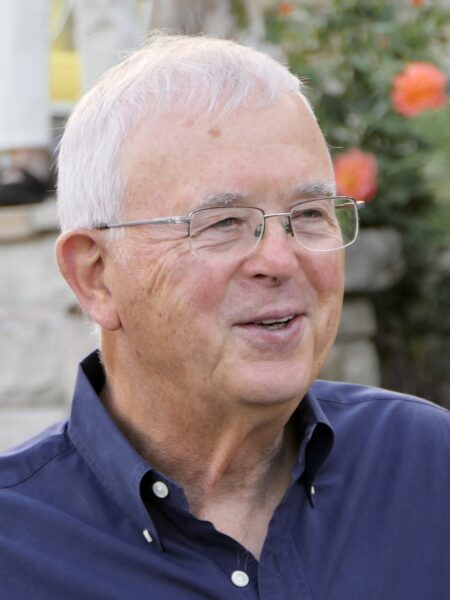
As librettist, Neil Bicknell comes to the task with a unique perspective. He grew up in Middlebury, Vermont where Robert Frost was a presence every summer while teaching at Middlebury’s Summer School of English. He has walked, and walked again the same trails as Frost, been educated by the mountains, the secrets of the woods, the resilience of the people. He first heard Frost recite his poems at age 15. Then Bicknell attended Amherst College during Frost’s final years there, again hearing Frost’s distinctive delivery. He was there to hear President Kennedy honor Frost in 1963.
Bicknell has dedicated the past decade to seeking to understand and address problems with our democracy. When he and his Amherst ’64 classmates considered how to address those problems during their 50th reunion, they looked back to the impact JFK’s speech of October 26, 1963 had on them — the importance of the arts, truth, public service, the power of an inspirational leader. Feeling those messages and civic values needed to be heard by today’s generation, they created an award-winning documentary, companion book, website and now symphony to bring those messages forward.
Following Amherst and an MBA at Columbia, Bicknell served as an officer in the U.S. Navy during Vietnam then pursued a career in finance on Wall Street.
The Symphony As Celebration
“JFK: The Last Speech” celebrates the civic values and inspiring leadership of President John F. Kennedy, and the spirit of the great American poet, Robert Frost. The Symphony is a project of members of the Amherst Class of 1964 through their non-profit Reunion ’64, Inc. They had the privilege of witnessing President Kennedy deliver his last major speech, October 26, 1963. The Symphony joins two earlier projects, a book and documentary that are both titled, “JFK: The Last Speech.” (See The Book and The Film pages of this website.)
-
-
- Amherst graduates are invited to join in support of this project.
- Orchestras interested in performing the Symphony are invited to contact us.
- Co-commissioning opportunities are available.
-
Please contact: JFKTheLastSpeech@gmail.com for additional information.
Our Supporters
Robert Benedetti
Neil & Judy Bicknell
Douglas Bray & Francine Austin
Deborah & Constantine Georgopoulos
James Giles
Stuart Johnson
Robert and Dorothy Knox
Peter Manuelian & Carol Hooven
Roger & Katherine Mills
Terry Segal
Vince Simmon
Stephen & Elizabeth Smith
Richard & Ruth Sparks
Charles & Katharine Stover
Notes:
1 Information in this paragraph and the remainder of this section is from the website: coloradomusicfestival.org
2 Information in this paragraph and the remainder of this section is from the website: adolphushailstork.com.
3 Information in this paragraph and the remainder of this section is from the websites: peteroundjian.com and coloradomusicfestival.org
Photo Credits:
The lead photo of the Colorado Music Festival Orchestra is used courtesy of the photographer, Geremy Kornreich. The orchestra is pictured in the Chautauqua Auditorium.
Pictures of the performers at the Colorado Music Festival Premiere Performance are used courtesy of CMF and Geremy Kornreich.
The photo of Neil Bicknell, Peter Oundjian and Bestor Cram following the performance is used courtesy of Judy Bicknell.
The photos of the Dallas Symphony Orchestra Performance are used courtesy of the Orchestra and Sylvia Elzafon.
The photos of the National Symphony Orchestra Performance that directly face the stage are used courtesy of Scott Suchman. The photos of the NSO taken from the left side of the audience (that include views of the audience) are used courtesy of Judy Bicknell.
The photos of the Indianapolis Symphony Orchestra Performance are used courtesy of the Indianapolis Symphony Orchestra.
The picture of Robert Frost is from the Library of Congress.
The photo of President Kennedy, by the White House Press Office, is used courtesy of the John F. Kennedy Presidential Library and Museum. Public Domain.
The photo of Dr. Hailstork is courtesy of the Colorado Music Festival and Geremy Kornreich.
The photo of Peter Oundjian is from his website, PeterOundjian.com.
The photo of Neil Bicknell is used courtesy of the photographer, Charlie Erdrich.
